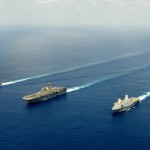With French President Emmanuel Macron as the chief guest at India’s Republic Day celebrations this week, it is apt to highlight the deepening bilateral affinity in worldview and foreign policy. France, a resilient nation that turned from a vanquished state into a victorious ally in World War II, understands the value of military alliances as well as the imperative of retaining independence in external relations. Driven by similar impulses, India has created its own equilibrium from the heyday of the Non-Aligned Movement to the present era of multi-alignments. The ability to maintain multiple strategic partnerships while safeguarding its ‘strategic autonomy’ makes New Delhi, with its growing political and economic weight, a preferred partner for Paris. This mutual empathy and the steady growth in bilateral cooperation are vividly reflected in their Indo-Pacific policies.
In the past decade, the salience of the Indo-Pacific has grown substantially for both regional and extra-regional powers. The US-China contestation, supply chain constraints, climate change, and technological challenges have made the Indo-Pacific a central theatre of global geopolitics. This trend has remained unchanged, despite other major developments in the 2020s such as the Russia-Ukraine war, the Israel-Gaza conflict and the persistent impact of the pandemic on the global economy.
India has little difficulty in recognizing France as “a resident power” in the Indo-Pacific. The latter is the only member state of the European Union (EU) that has territories in the region: La Reunion, Mayotte, New Caledonia, French Polynesia, and others. France has the world’s second-largest Exclusive Economic Zone (EEZ), after the U.S. It also has 1.65 million people in its départements and territories. Besides, it maintains over 7,000 military personnel to defend its sovereignty and contribute to regional security. Paris made public its Indo-Pacific strategy in 2018, with updates in 2021 and 2022. It played a key role, together with Germany and the Netherlands, to help the EU fashion its Indo-Pacific strategy.
France views the region as marked by growing polarisation and rising tensions. It supports multilateral cooperation, based on respect for “all sovereignties.” It is committed to building “a multipolar Asia.” Policies and actions by the states today, it believes, will determine the balance of power in the region tomorrow.
At the core of France’s Indo-Pacific policy lies the conviction that France and Europe have “interests to defend, values to promote and partnerships to forge” in the region. President Macron has stated that as “a fully-fledged Indo-Pacific country,” France aims to be a stabilizing force, promoting the values of freedom, rule of law, and “rejection of coercion.” Its Indo-Pacific strategy has four key pillars: security and defence, economic development and connectivity, promotion of effective multilateralism, and the commitment to the “common goods” including the ability to meet strict climate and biodiversity requirements of the region. Energy transition, Blue Economy and sustainable ocean development are included. It advocates the idea that the Indo-Pacific must be “one of the main priorities of our European agenda.”
In recent years, the Indo-French dialogue has progressively assigned greater attention to developing convergences in their perspectives. In 2018, the two governments articulated a joint strategic vision of cooperation in the Indian Ocean region. Five years later, they broadened it, discovering ample commonality in their assessments of the larger Indo-Pacific region. Even their definitions matched: while the French view the Indo-Pacific as stretching from ‘Djibouti to Polynesia’, India defines it as extending from ‘Kilimanjaro to California’. While presenting a shared vision of their strategic partnership in the next 25 years in a historic document Horizon 2047, they agreed to provide “concrete solutions to make Indo-Pacific an area of stability and sustainable development.” Further, to emphasize that this vision needs translation into reality, a jointly agreed ‘Roadmap’ was issued last September.
The two countries have committed to enhancing cooperation in five major segments of the region: Africa, the Indian Ocean region, South Asia, Southeast Asia, and the Pacific. Since even their combined resources are not adequate to shoulder responsibilities for such a vast region, Paris and New Delhi are fully conscious of the need to forge stronger collaboration with other stakeholders like the UAE, Japan, Australia, and ASEAN. All relevant fora – bilateral, trilateral, and multilateral – will be utilized for this purpose.
With France joining the maritime resources pillar of India’s Indo-Pacific Oceans’ Initiative (IPOI), the way has been cleared for activating this forum through specific projects. A new India-France enterprise – Indo-Pacific Triangular Development Cooperation Fund (IPTDC) – has been announced. Its modalities are under discussion. This holds promise, as the two countries are already early partners in building new institutions like the International Solar Alliance and the Coalition for Disaster Resistant Infrastructure.
Finally, two more observations need to be made here. First, India – progressively close to Western democracies and assiduously befriended by G7 – and France – a member of the NATO and EU – need to talk to each other more about China’s role in the Indo-Pacific. France’s views are moulded by a mix of mercantilist and strategic considerations. Of course, what the two governments discuss on this sensitive subject cannot be brought into the public domain. This is where their premier think tanks can step in by conducting a regular dialogue on the nature and magnitude of challenges posed by China’s aggressive behaviour, especially relating to the Philippines, South China Sea, South Pacific, Sri Lanka, and the Maldives.
Second, it is satisfying to note that Paris and New Delhi have developed an ambitious plan for cooperation in the Indo-Pacific for the next 25 years. What they now need to focus is on devising a set of timelines for steadily implementing the proposals included in the agreed roadmap. By keeping their people informed of the progress in this realm, the two governments will help their cause, enhancing the credibility of their joint strategy.
Rajiv Bhatia is Distinguished Fellow, Foreign Policy Studies, Gateway House.
A version of this article appeared in The Indian Express.


